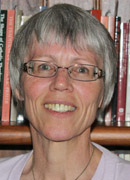
A scene from “Entertaining Angels: The Dorothy Day Story” replays in my mind. A female guest in the Catholic Worker House that Dorothy runs for the poorest of the poor beats Dorothy mercilessly with a cane. The petite Dorothy, with a fierce will to live, manages to pull the cane from alcoholic Eleanor’s clenched hands and appears ready to turn on her. But as she lifts the cane to strike Eleanor, Dorothy stops as if the hand of God has touched her shoulder. She starts to cry and then hugs Eleanor tightly in her arms. The two women sob in misery, one exhausted from the work of advocating for and tending to people in desperate need; the other reeling in despair and whose self-esteem registers “empty.” Who among us hasn’t experienced a sense of brokenness in our lives? Who among us hasn’t loved an Eleanor?
This scene most emphatically visualized for me the very real challenge of the Gospel message to care for the least of our brothers and sisters in every sense of word. Care as in meeting physical needs; care as in lending a hand up and not just a hand out.
Professor Keith Soko of St. Ambrose University’s theology department showed the Dorothy Day movie last weekend during Moral Theology II, a course I’m taking with Deacon Class VI of the Davenport Diocese, their spouses and other individuals.
Throughout the weekend we studied Church documents, Scripture and theologians’ explanation of Catholic teaching on social justice.
We discussed the seven principles of Catholic Social Teaching: the dignity of the human person, the dignity of work, the person in community, rights and responsibilities, options for those in poverty, solidarity and care for creation.
We talked about economic justice and what constitutes a living wage. We explored the balance between the individual and society and how as Catholic Christians we ought to always strive for the common good.
We learned that the plight of the poor is common ground for the three major religions of the world: Christianity, Judaism and Islam. In a video clip our class watched called “The Great Religions and the Poor,” a Roman Catholic priest made an observation that touched me. The Eucharist “is a meal where all are served. At this table, there are no poor.” Indeed, at our Lord’s table we are all equals.
It seems ironic that as we were studying the preferential option for the poor in our class, the U.S.’s major political parties were squabbling over the middle class; the poor seem to have no political clout whatsoever.
Our class also considered what it means to have a consistent ethic of life and how that relates to Pope John Paul II’s Gospel of Life. One observation the late Holy Father made in that letter gives reason to reflect on a regular basis. “The eclipse of the sense of God and of man inevitably leads to a practical materialism …The values of being are replaced by those of having.”
I plead guilty to being more materialistic than altruistic. I am not as selfless as Dorothy Day, but I can attempt to imitate in a small way her commitment to human dignity. Like every saint to be, she had weaknesses and failings. I can identify with that fact, too. The scene from the movie of her life crystallized for me that in our brokenness we come to discover our shared humanity.
Barb Arland-Fye







